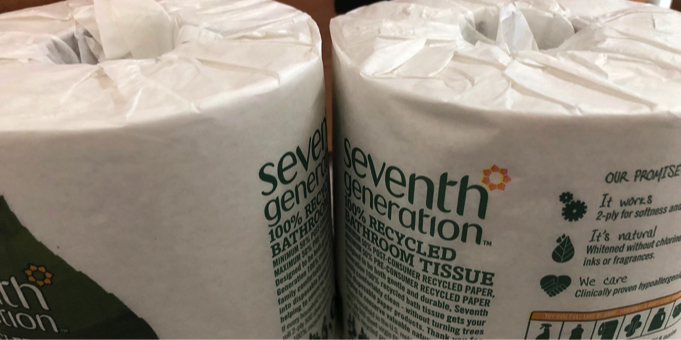Tips from Sierra Club for buying more sustainable toilet tissue.
The average American flushes away 384 trees’ worth of toilet paper in a lifetime, and though we account for just over 4 percent of the global population, we consume 20 percent of the world’s toilet paper. This “tree to toilet” pipeline is not only destroying woodlands and exacerbating the climate crisis but also displacing the communities and creatures that rely on forests. In particular, the loss of intact Canadian boreal forest—the massive carbon storehouse where many North American TP makers source the virgin pulp necessary to make the fluffy two-ply stuff—is impacting Indigenous peoples’ way of life and driving the decline of caribou and lynx species.
Lest you think this story is going to be all crap news, know that there are plenty of toilet paper and tissue manufacturers that make products with recycled content. Just last month, the NRDC released a handy scorecard, The Issue With Tissue, grading the sustainability factors of a number of name-brand products. Three of the best-selling brands in the United States—Quilted Northern, Cottonelle, and Charmin Ultra Soft—fetched shitty grades (D’s or F’s), largely because that sought-after spa-for-your-seat texture requires a lot more carbon emissions to produce. The NRDC gave A’s to brands that use recycled paper content, including 365, Seventh Generation, Natural Value, and Trader Joe’s Bath Tissue; however, the top-of-their-class tissue brands are not exactly on a roll—despite good grades in the regular TP department, 365’s Sustainably Soft and Trader Joe’s Super Soft Bath Tissue varieties both got D’s.
The NRDC’s Shelley Vinyard, coauthor of the study, says consumer response has been overwhelming. “I don’t think people typically think of their toilet paper use as an environmental decision,” she says. “It’s a product you use once and throw away, so you don’t really spend much time thinking about the fact that major tissue brands rely on virgin forests for their recipes—they’ll say they have to source from the boreal because [virgin timber] provides the softness and strength that US consumers demand.”
“It’s a product you use once and throw away, so you don’t really spend much time thinking about the fact that major tissue brands rely on virgin forests for their recipes—they’ll say they have to source from the boreal because [virgin timber] provides the softness and strength that US consumers demand.”
Another issue is that plush, fancy TP is typically bleached, which can be quite harmful to waterways. “The good news is, when you use recycled content, it actually doesn’t require that first round of bleaching,” Vinyard says. The NRDC is calling for all companies to start using recycled content in tissue paper products, in hopes of putting a dent in deforestation of the boreal, where “seven NHL hockey rings are logged per minute,” according to Vinyard. “When you think about those costs, switching to more recycled content seems like an easy option for big brands like Procter & Gamble [makers of Charmin], Kimberly-Clark [Cottonelle and Kleenex], and Georgia Pacific [Quilted Northern and Angel Soft].”
Feeling down in the dumps about all this? Vinyard advises concerned consumers to exercise their purchasing power by making supermarkets aware of more sustainable preferences. The NRDC has also made it easy to write the CEO of Procter & Gamble to remind the conglomerate that consumers care about where their products come from. “We’ve seen that dynamic work time and again over the years,” says Vinyard. “It’s going to take major companies investing in innovation and using their roles as corporate citizens to acknowledge the impact of their products and to choose to operate more sustainably.”
But at present, we’re rolling in the deep. And if tissue paper manufacturers continue to log forests at their current pace, we’ll be effectively flushing any hopes of climate goals outlined in the Green New Deal and the Paris climate accord down the john.
So why not embrace the tiny sacrifice that is the slightly rougher wipe so we can save all our butts?
BY KATIE O’REILLY | MAR 14 2019



Recently on Twitter